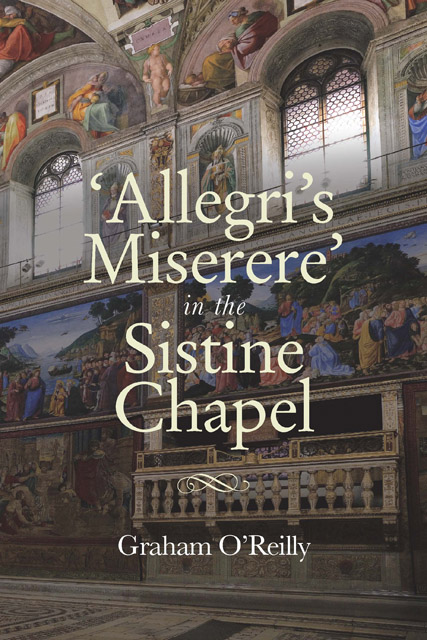Book contents
- Frontmatter
- Contents
- List of illustrations
- List of tables
- List of music examples
- Acknowledgments
- Note on the text
- Introduction: myth and reality
- Part One The Sixteenth and Seventeenth Centuries
- Part Two The Eighteenth Century
- Part Three The Nineteenth Century
- Part Four Performing the Miserere in the Twentieth Century
- Part Five Appendices, Editions and Notes
- List of appendices
- Bibliography
- Index
Introduction: myth and reality
Published online by Cambridge University Press: 13 January 2023
- Frontmatter
- Contents
- List of illustrations
- List of tables
- List of music examples
- Acknowledgments
- Note on the text
- Introduction: myth and reality
- Part One The Sixteenth and Seventeenth Centuries
- Part Two The Eighteenth Century
- Part Three The Nineteenth Century
- Part Four Performing the Miserere in the Twentieth Century
- Part Five Appendices, Editions and Notes
- List of appendices
- Bibliography
- Index
Summary
Few musical works have as interesting a history, and are nowadays so little understood, as the famous Miserere associated with the name of Gregorio Allegri. It is largely known today from performances in English chapels and cathedrals by choirs of men and, mostly, boys, and in concerts by professional choirs including women. But in its heyday, the eighteenth and nineteenth centuries, visitors came from throughout the world to hear it sung by the College of Papal Singers in the Sistine Chapel. There the higher parts were always performed by castrati, whose presence in the choir is documented from 1562. Their particular vocal skills were important for many aspects of the choir’s unique performing style, and it was their contribution more than anything else that made the Miserere famous. Its popularity meant that a small part of the music of the Roman polyphonic school remained always in the public eye before the rediscovery of Palestrina in the nineteenth century.
After hearing the Miserere in 1770, Leopold Mozart wrote that ‘the manner of performance contributes more to its effect than the composition itself.’ Later the same year, Charles Burney echoed the same thought almost word for word, albeit by hearsay, writing that ‘its beauty and effect … owes more to the manner in which it is performed, than to the composition’. Even this may be understating the case. The history of the Miserere shows it to have been one of those rare works which only really existed within a performance context. The notes of what we suppose to be Allegri’s original composition can of course be transcribed from Vatican sources (see Appendix 1) but reveal little or nothing of what made it renowned throughout Europe. Within fifty years it was said to have become unrecognisable because of the ornamentations added by the singers, and within a hundred the five-part verses (1, 5, 9, 13, 17 and the first part of 20) had been recomposed; the first published edition – Burney’s, in 1771 – gives a version of those verses which has been modified out of all recognition from Allegri’s original.
The work commonly sung nowadays, referred to hereinafter as the ‘English Miserere’, combines that source (different in many details to Vatican manuscripts) with a fanciful reconstruction of the four-part ones (verses 3, 7, 11, 15 and 19) dating from late nineteenth century, which contains the famous ‘high Cs’.
- Type
- Chapter
- Information
- Allegri's Miserere in the Sistine Chapel , pp. 1 - 4Publisher: Boydell & BrewerPrint publication year: 2020



